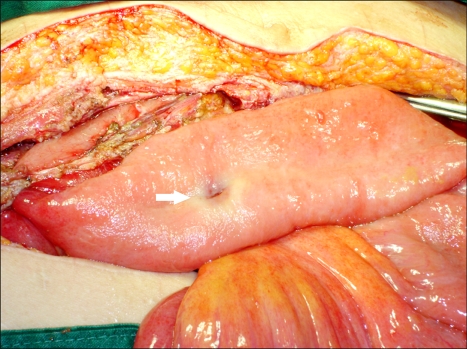Cancer Res Treat.
2008 Mar;40(1):33-35.
Intestinal Perforation in Colorectal Cancers Treated with Bevacizumab (Avastin(R))
- Affiliations
-
- 1Department of Surgery, Kosin University College of Medicine, Busan, Korea. gscrslsh@hanmail.net
- 2Department of Internal Medicine, Kosin University College of Medicine, Busan, Korea.
Abstract
- Bevacizumab is a monoclonal antibody that targets vascular endothelial growth factor (VEGF), and it has shown promise as a clinical agent against metastatic colorectal cancer, and particularly in combination with chemotherapy. Bowel perforation is a known risk that's associated with bevacizumab use, but the etiology is unknown. Here we report on two cases of metastatic colorectal cancer in which the patients suffered from intestinal perforation after chemotherapy with bevacizumab. For the first case, a 47 year-old man had rectal cancer with concurrent liver and lung metastasis. He underwent chmotherapy with 5-fluorouracil, irinotecan and bevacizumab. Fever and abdominal pain developed seven days later, and rectal perforation was identified upon exploration 13 days later. For the second case, a 48 year-old woman had sigmoid colon cancer with peritoneal and ovary metastases. After seven days of chemotherapy with 5-fluorouracil, oxaliplatin and bevacizumab, exploratory surgery revealed a perforation at the ileum.
MeSH Terms
-
Abdominal Pain
Antibodies, Monoclonal, Humanized
Camptothecin
Colorectal Neoplasms
Female
Fever
Fluorouracil
Humans
Ileum
Intestinal Perforation
Liver
Lung
Neoplasm Metastasis
Organoplatinum Compounds
Ovary
Rectal Neoplasms
Sigmoid Neoplasms
Vascular Endothelial Growth Factor A
Bevacizumab
Antibodies, Monoclonal, Humanized
Camptothecin
Fluorouracil
Organoplatinum Compounds
Vascular Endothelial Growth Factor A
Figure
Reference
-
1. Presta LG, Chen H, O'Connor SJ, Chisholm V, Meng YG, Krummen L, et al. Humanization of an anti-vascular endothelial growth factor monoclonal antibody for the therapy of solid tumors and other disorders. Cancer Res. 1997; 57:4593–4599. PMID: 9377574.2. Kabbinavar F, Hurwitz H, Fehrenbacher L, Meropol NJ, Novotny WF, Lieberman G, et al. Phase II, randomized trial comparing bevacizumab plus fluorouracil (FU)/leucovorin (LV) with FU/LV alone in patients with metastatic colorectal cancer. J Clin Oncol. 2003; 21:60–65. PMID: 12506171.
Article3. Chen HX, Mooney M, Boron M, Vena D, Mosby K, Grochow L, et al. Phase II multicenter trial of bevacizumab plus fluorouracil and leucovorin in patients with advanced refractory colorectal cancer: an NCI Treatment Referral Center Trial TRC-0301. J Clin Oncol. 2006; 24:3354–3360. PMID: 16849749.
Article4. Hurwitz H, Fehrenbacher L, Novotny W, Cartwright T, Hainsworth J, Heim W, et al. Bevacizumab plus irinotecan, fluorouracil, and leucovorin for metastatic colorectal cancer. N Engl J Med. 2004; 350:2335–2342. PMID: 15175435.
Article5. Scappaticci FA, Fehrenbacher L, Cartwright T, Hainsworth JD, Heim W, Berlin J, et al. Surgical wound healing complications in metastatic colorectal cancer patients treated with bevacizumab. J Surg Oncol. 2005; 91:173–180. PMID: 16118771.
Article6. Gordon MS, Cunningham D. Managing patients treated with bevacizumab combination therapy. Oncology. 2005; 69(suppl 3):25–33. PMID: 16301833.
Article7. Lordick F, Geinitz H, Theisen J, Sendler A, Sarbia M. Increased risk of ischemic bowel complications during treatment with bevacizumab after pelvic irradiation: report of three cases. Int J Radiat Oncol Biol Phys. 2006; 64:1295–1298. PMID: 16503384.
Article8. Saif MW, Elfiky A, Salem RR. Gastrointestinal perforation due to bevacizumab in colorectal cancer. Ann Surg Oncol. 2007; 14:1860–1869. PMID: 17356952.
Article
- Full Text Links
- Actions
-
Cited
- CITED
-
- Close
- Share
- Similar articles
-
- Bevacizumab induced intestinal perforation in patients with colorectal cancer
- Bevacizumab-associated Ischemic Colitis Proven by Colonoscopy
- Anti-Tumor Effects of Vascular Endothelial Growth Factor Inhibitor on Oral Squamous Cell Carcinoma Cell Lines
- A Case of Severe Bevacizumab-induced Ischemic Pancolitis, Treated with Conservative Management
- The Conservative Treatment of Rectal Perforation after Insertion of A Stent and Chemo-Radiotherephy in the Patient with Obstructive Rectal Cancer



